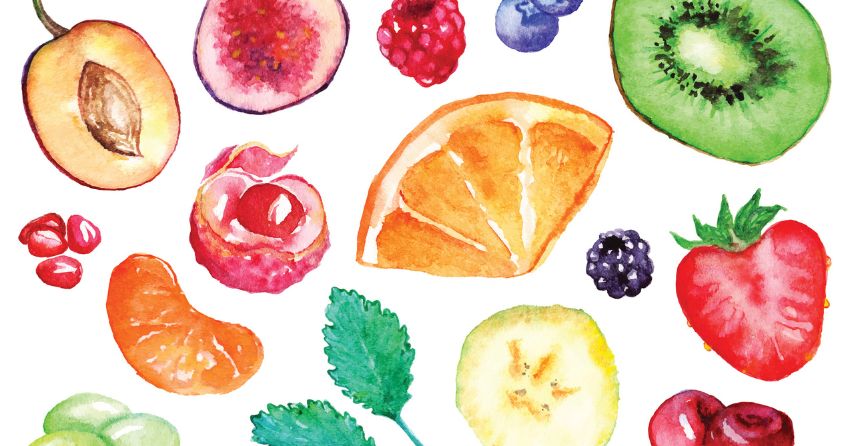Polyphenol-Rich Diet Supports Healthier Inflammatory Response and Gut Microbiota

-
Dietary polyphenols in the foods that we eat can prevent inflammation in older people by altering intestinal microbiota and inducing the production of the metabolite indole 3-propionic acid (IPA).
-
IPA is derived from the degradation of tryptophan by gut bacteria and is considered a postbiotic.
-
Older adults who ate a diet rich in polyphenols generated a significant increase in the blood IPA levels, plus a decrease in inflammation levels and beneficial changes in gut bacteria.
-
The researchers analyzed gut microbiota from fecal samples of 51 older adults who ate a diet high in polyphenols (green tea, bitter chocolate, apples, pomegranate, and blueberries) for eight weeks.
This article was posted on EurekAlert.org:
Polyphenols in the foods that we eat can prevent inflammation in older people, since they alter the intestinal microbiota and induce the production of the indole 3-propionic acid (IPA), a metabolite derived from the degradation of tryptophan due to intestinal bacteria. This is stated in a study published in the journal Molecular Nutrition and Food Research, carried out by the Research Group on Biomarkers and Nutritional & Food Metabolomics of the Faculty of Pharmacy and Food Sciences of the University of Barcelona and the CIBER on Fragility and Healthy Ageing (CIBERFES).
The team, led by Professor Cristina Andrés-Lacueva, from the Faculty of Pharmacy and Food Sciences of the UB, is also membre of the Food Innovation Network of Catalonia (XIA).
Polyphenols and healthy ageing
Polyphenols are natural compounds, considered probiotics, which we eat mainly through fruits and vegetables. Several dietary polyphenols have well-kown antioxidant and anti-inflammatory properties, as well as the ability to interact with bacteria present in the human gut and to produce postbiotics (such as IPA), which increases its positive effects on health.
There is increasing evidence that confirms that the regular consumption of polyphenols in the diet can contribute to a healthy ageing, specially if they are part of a healthy diet, such as the Mediterranean one, and are associated with a healthy lifestyle, that is, one including regular physical activity and excluding tobacco and alcohol, for instance.
The study shows the interaction between polyphenols and gut microbiota can induce the proliferation of bacteria with the ability to synthetize beneficial metabolites, such as IPA, a postbiotic with antioxidant, anti-inflammatory and neuroprotective properties that contributes to improve the health of the intestinal wall. Therefore, this compound would contribute to the prevention of some diseases associated with ageing.
“If we consider the beneficial effects of IPA on the gut microbiota and health in general, it is important to find reliable strategies to promote the production of this metabolite”, notes the co-first signatory of the study, Tomás Meroño, from the Department of Nutrition, Food Sciences and Gastronomy of the UB and CIBERFES.
As part of the study, the researchers carried out a multiomic analysis to monitor the IPA levels in the serum, apart from analysing the composition of the gut microbiota on faecal samples of fifty-one volunteers aged over sixty-five who kept following a diet rich in polyphenols (green tea, bitter chocolate, fruits including apples, pomegranate and blueberries) for eight weeks.
Increase of IPA in blood and bacterial growth
The results show that the diet rich in polyphenols generated a significant increase in the blood IPA levels, together with a decrease in inflammation levels and changes in the bacteria of the microbiota, from the order of Bacteroidales.
Surprisingly, the researchers did not observe the same effects in the volunteers with kidney diseases, which could be explained due to the altered composition of their gut microbiota. These people showed lower amounts of IPA at the beginning of the trial compared to the volunteers with normal kidney function.
“These results could be clinically relevant, since the low IPA levels have been associated with a rapid decline of kidney function and a chronic kidney disease”, notes Professor Cristina Andrés-Lacueva.
Therefore, a polyphenol-rich diet including probiotic foods such as green tea, dark chocolate and some fruits like apples, pomegranate and blueberries could increase the production of IPA through changes in the composition of gut microbiota. This increase in the levels of a postbiotic such as IPA in the elderly could be beneficial in delaying or preventing chronic diseases that harm the quality of life.
The study also includes the participation of teams from the University of Milan (Italy), Quadram Institute (United Kingdom) and the National Institute of Health and Sciences on Ageing (INCRA, Italy), among other institutions.
JOURNAL
Molecular Nutrition & Food Research





